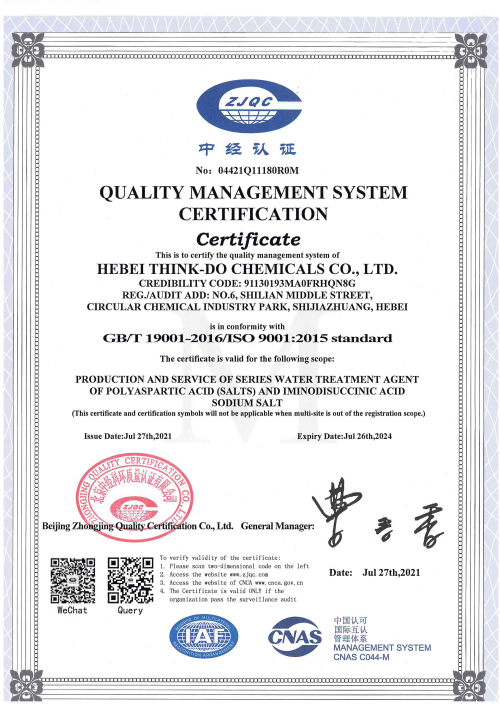
News
12月 . 18, 2024 03:17 Back to list
iron chelating agent meaning factory
Understanding Iron Chelating Agents and Their Significance
Iron is an essential element that plays a crucial role in various biological processes, including oxygen transport, DNA synthesis, and electron transport. However, the overabundance of iron can be detrimental, leading to oxidative stress and cellular damage. This is where iron chelating agents come into play, acting as pivotal substances in managing iron levels in both biological and industrial contexts.
What are Iron Chelating Agents?
Iron chelating agents are molecules that bind to free iron ions in the environment, forming stable complexes that make the iron less reactive. These agents can be naturally occurring or synthetic compounds. They are characterized by their ability to chelate or grasp iron ions through several coordination bonds, effectively reducing the bioavailability of iron and preventing it from participating in harmful reactions, such as the Fenton reaction that generates free radicals.
Different types of chelators exist, classified mainly by their structure and the metal ions they can bind to. For instance, the most commonly used iron chelating agents include ethylenediaminetetraacetic acid (EDTA), desferrioxamine, and deferasirox. They are widely utilized in various applications ranging from medical treatments to agricultural practices.
Medical Applications
In medicine, iron chelating agents are crucial in treating conditions related to iron overload, such as hemochromatosis and thalassemia. Patients with these disorders may experience excess accumulation of iron in their organs, leading to severe complications. Iron chelators, such as deferoxamine, are administered to help the body excrete excess iron, thereby alleviating damage to vital organs like the liver and heart.
The mechanism of action involves the chelating agent binding to iron in the bloodstream, forming a complex that is excreted predominantly through the kidneys. This process is vital because it not only reduces iron levels but also protects against oxidative stress caused by free iron ions.
Agricultural Importance
Iron chelating agents are also integral in the agricultural sector. In soils with high pH levels, iron becomes less soluble and unavailable to plants, leading to iron deficiency, which manifests as yellowing of the leaves (a condition known as chlorosis). By applying iron chelators, farmers can enhance the availability of iron to plants, improving their health and productivity.
iron chelating agent meaning factory

For instance, chelated forms of iron, such as iron EDTA or iron DTPA, are often used in fertilizers to ensure that crops receive the necessary nutrients without causing toxic effects due to excess iron. This application not only boosts crop yields but also enhances the nutritional value of food products.
Industrial Uses
Industrially, iron chelating agents have essential roles in various processes. They are often utilized in cleaning products to prevent metal ions from interfering with the effectiveness of detergents. In textiles, chelators help maintain color by binding iron impurities that could cause staining.
Moreover, in the food industry, they are employed as additives to prevent spoilage and maintain product quality by binding to metal ions that catalyze oxidation. This helps extend shelf life and ensures consumer safety.
Challenges and Future Directions
Despite their numerous benefits, the use of iron chelating agents does come with challenges. Some synthetic chelators may not be biodegradable. Thus, the accumulation in the environment can pose ecological risks. As a result, researchers are focused on developing more sustainable and environmentally friendly iron chelating agents.
Future developments may incorporate biodegradable or naturally derived chelating agents that can perform the same functions without long-term environmental impacts. Moreover, ongoing research into the efficacy and safety of these agents will help in tailoring solutions better suited for various applications.
Conclusion
Iron chelating agents serve as invaluable tools across numerous fields, including medicine, agriculture, and industry. Their ability to regulate iron levels, promote plant health, and enhance product quality underscores their significance. By understanding and advancing the science of chelation, we can better manage iron-related challenges while paving the way for innovative solutions in the future. As we continue to explore the potential of iron chelating agents, we can expect significant advancements that will benefit both human health and the environment.
-
OEM Chelating Agent Preservative Supplier & Manufacturer High-Quality Customized Solutions
NewsJul.08,2025
-
OEM Potassium Chelating Agent Manufacturer - Custom Potassium Oxalate & Citrate Solutions
NewsJul.08,2025
-
OEM Pentasodium DTPA Chelating Agent Supplier & Manufacturer High Purity & Cost-Effective Solutions
NewsJul.08,2025
-
High-Efficiency Chelated Trace Elements Fertilizer Bulk Supplier & Manufacturer Quotes
NewsJul.07,2025
-
High Quality K Formation for a Chelating Agent – Reliable Manufacturer & Supplier
NewsJul.07,2025
-
Best Chelated Iron Supplement for Plants Reliable Chelated Iron Fertilizer Supplier & Price
NewsJul.06,2025
